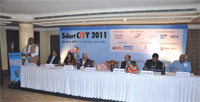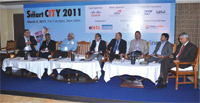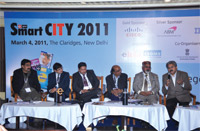Driving Forces Behind Smart Cities
Smart city via denizens’ feedback

 A key step towards building smart cities is to include citizens as stakeholders and participants and not as mere beneficiaries
A key step towards building smart cities is to include citizens as stakeholders and participants and not as mere beneficiaries
Egov in collaboration with the Ministry of Urban Development, Government of India (GoI) hosted the second edition of Smart City event on March 4th, 2011, in the Capital.

The convention this year focused on the issues such as challenges faced to build sustainable smart cities with proper usage of resources and also saving up the non-renewable ones; how can technology be an effective enhancer and enabler for urban governance; challenges faced by municipal corporations and scope and need of municipal e-Governance.
In his inaugural address, Saugata Roy, Union Minister of State, Ministry of Urban Development, Government of India said that the uncontrolled population explosion is leading to creation of slums and worst conditions of living. To deal with this issue of rising slum Rajiv Awas Yojana was formulated.
“Although this year, there has been little allocation for Rajiv Awas Yojana in the budget, next year we will have an allocation of `6,000 crore,” the minister stated.
Speaking about the concept of smart cities he said, “The smart city infrastructure is an introductory step for establishing the overall smart city framework and architecture. Very few smart cities have recently been established in the world including Dubai, Malta, Kochi and Singapore.” He talked about six dimensions of a smart city, which includes smart economy, smart mobility, smart environment, smart people, smart living and smart governance; and stressed upon the role and significance of information and communication technology in facilitating the same.
Stating the objectives of Jawaharlal Nehru Urban Renewal Mission (JNNURM), Aruna Sundarajan, Joint Secreatary, Ministry of Urban Development and Poverty Alleviation said,
” With the help of JNNURM we have managed to bring to centre-stage the need for reforms; and several cities and states have enthusiastically gone ahead with the reform agenda.”
She stressed upon housing as a main issue and also a growth sector. “There is also an increasing realisation in countries all over the world that housing is a huge growth multiplier,” Sundarajan said on the issues of housing and slums development in urban areas.
Sanjiv Mittal, Director, National Institute for Smart Government spoke on the importance of planned development of cities so as to enable them to become urban centres of growth. Pointing out the need for a uniform national policy or framework for e-Governance projects, Mittal said, “If every city does e-Governance projects as an independent entity it will take a long time to reap its benefits.” “Can we take advantages of what has already been done in one city and take it across?” he reasoned.
Tapas Ghatak, Former Director- Kolkata Metropolitan Development Authority, in his address proposed the Ministry of Urban Development release documentation of the ‘best and worst practices’ of JNNURM across states so that lessons are learnt and successful models reviewed by everyone.
He conceded that citizens were not yet a part of the planning process and thus a key stakeholder is being missed out.
Building Sustainable Cities
Sustainability is the key
 Optimum utilisation of available resources, streamlining of IT and planned governance are key to sustainable cities
Optimum utilisation of available resources, streamlining of IT and planned governance are key to sustainable cities
The panel brooded upon issues including building smart and sustainable cities. The session developed a consensus that it takes proper utilisation of available resources, streamlining of IT with traditional methods and a planned governance to make a city sustainable over a period of time.
The session was moderated by Prakash Kumar, Director, Global Public Sector Practice, Cisco Systems and had some very eminent personalities from public as well as private sector. “We need to have sustainability as the main goal in three fronts- economic, environmental and social,” he said.
Vivek Bharadwaj, CEO, Kolkata Metropolitan Development Authority apprised about the new project of Baruipur Development in Kolkata. He opined that the project has taken into consideration challenges including conservation of energy and resources, integrated infrastructure and use of latest technology. He shared a presentation showing various aspects of the development project and thus gave lessons to learn and knowledge to share.
Brijesh Kumar, Former Chairman and CEO, Greater Noida Authority stressed upon the urbanisation challenges. The resource crunch and the environment issue which has risen due to climate change. “Planning and simplified governance are the key issues to build and sustain a smart city,” he said.
He also said how huge sociological gaps have come up even when it comes to infrastructure and urbanisation, “We either create luxurious pockets in our cities with all world-class amenities or we have the extremely poor, there is a huge segment which is the average citizen whose needs are getting ignored due to these extreme situations,” he said. He also gave a brief chronological presentation on Greater Noida’s development and planning.
Dinesh Mohan, Volvo Chair Professor, IIT Delhi defined a smart city as, “A city where my daughter and grandmother, both, can walk and cross the roads alone in evenings.” Articulating technology’s role in building smart cities, he said, “We must remember that there were wonderful cities about 50 years ago like Amsterdam and Barcelona when the level of IT availability was zero. So the issue is not just technology availability, the issue is basic infrastructure.”
He gave statistics regarding urban transport and its relation with climate change saying, “IT in urban climate change is an enabler but not attractor.” He further elaborated on increased carbon dioxide production of different countries and regions. Presenting some facts, he said, “By 2050, our per capita carbon dioxide production would be around 5 tons.” “Poor people will have to increase energy consumption and rich and middle-class must reduce energy consumption to attain equity,” he added.
Rashmi Singh, State Project Coordinator, GNCTD-UNDP concluded the session by elaborating on what all make a city sustainable. She said, “There is no dearth of resources in big cities like Delhi, there is rather a need for a concerted strategy which will bring together all components to bridge disconnects or the gaps in society.”
She spoke about using cutting-edge technologies and what are the various implementation challenges when it comes to do a fusion of human resources and ICT for the cause of all-round development of cities.
Enhancing Stakeholder Competencies
Making services available to all
 Keeping pace with innovations in technology and regular capacity building are critical to improving stakeholders competency
Keeping pace with innovations in technology and regular capacity building are critical to improving stakeholders competency
With the growing aging population in the government, especially in municipalities, capacity building is a mammoth task. Keeping pace with the innovations in technology; having an in-house resource pool to manage technology; integrated approach towards governance; capacity building and change management were the point of deliberations of the session. The session was moderated by Rajeev Chawla, MD, KSCMF, Special Secretary, Bhoomi and Registration of Urban Properties, Government of Karnataka.
Satyendra Garg, JCP, Delhi Traffic Police (DTP) threw light on the new social media initiative, sms alerts and interactive website undertaken by the DTP for citizens. “The Facebook page started with an aim to connect with citizens and now it has more than 50,000 members,” he stated.
Shrikant Shitole, Vice-President, Cisco Systems spoke on the various new technologies that can be used in all aspects on governance from commutation to surveillance to better infrastructure. He also highlighted the changing role of government to make any nation progressive with the changing times.
Tarun Seem, Head, Health Systems Support Unit, Public Health Foundation of India touched upon the key aspect of importance of healthcare infrastructure in a smart city. “It’s not about monetising the municipalities or raising money for the government, it is about universal healthcare,” he commented. “Healthcare is a growing sector and a key vertical for proper growth of a city,” he added.
Anurag Goyal, Director, e-Governance, Department of Information Technology talked about the monetising issues of municipalities, where from and how to generate revenue for various services required by the citizens. “When the population increases, the demand for services like sewage disposal, water, roads, electricity, etc. rises,” he said.
“Estimates say that we would require about $1.2 trillion for capital expenses and $1 trillion for maintenance of that infrastructure in the next 20 years,” he revealed. He also threw light on issues like managing financial resources for all the essential services and IT upgradation in Municipalities. Goyal pointed out that land revenue, taxes and allocation of funds from central government are the three main sources of money for municipalities.
He also referred to underlying discrepancies in data management across the sectors in all authorities. He advocated use of technology for data management, which in turn would help in proper collection of rents and increased revenue for urban local bodies.
Tapas Ghatak, Former Director, KMDA dwelt upon Municipal e-Governance and its sustainability and the importance of realising citizens as the main stakeholders and participants. “Let me reiterate, citizens are being left behind in the decision making process and thus a key stakeholder is being missed out,” he said while talking on the importance of citizens in the progress of a city. The session concluded with S Velmurugan talking about making land transport environmentally sustainable.
Automation of Municipalities
Of new technologies and sustainability
 Automation and simplification of service delivery critical to empowerment of citizens and building of smart cities
Automation and simplification of service delivery critical to empowerment of citizens and building of smart cities
The session was moderated by Savitur Prasad, Secretary IT, Government of Delhi.
The session dwelt upon new technologies and how Municipal e-Governance can be made more efficient and interactive. Municipal e-Governance is taking shape across the country with Municipalities being an MMP under JNNURM. Various initiatives have been successfully carried out in various states and cities.
Savitur Prasad stated the possibility of computerisation of basic services like PDS, vegetable mandis and many others. “When basic amenities will be computerised and simplified then only citizens will be truly empowered and cities will become smart,” he said
Sanjeev Chopra, Joint Secretary, Ministry of Agriculture talked about the sensitivity of food prices in India and how big a challenge it is to ensure good food for everyone in the city. He also stated, “Usually the importance of agriculture gets diminished in talks of e-Governance as the focus usually gets on infrastructure, technology, health, sanitation and good food for good cities takes a back seat.”
He spoke on using new age technology such as GPS or some sort of monitoring through which everyone involved in the cities’ food chain can be tagged electronically and monitored. This is a way to curb the huge black marketing of food grains, fruits and vegetables. “Smart cities will need smart food and right technologies need to be incorporated to give smart food to the citizens,” he concluded.
Sameer Sharma of GHMC talked about Greater Hyderabad Municipal Corporation’s new mobile-based IT initiative Off-Site Real-Time Monitoring (OSRT) system which enables managing of civic amenities in a transparent and efficient manner. It uses a combination of Global Positioning System and General Packet Radio Services technologies through cellphones.
He displayed real-time how garbage disposals are monitored with the help of the real-time monitoring system and thus efficiency is attained. He shared how the initiative was born, “When I was in the IT department I always thought Mobile Phone as a technology and medium has the greatest potential. And when I moved to the Municipal Commission I was looking for accountability tools. We wanted social audit but in real time.”
AK Jain, former Commisioner (Planning), DDA gave the definition of smart city as, “Smart city is basically a synergy of space, services and the systems.” He talked of five-sensed smart cities and some idealisitic concepts for building infrastructure. He spoke on new-age recyclable building materials which are more effective and citizen-friendly. “We have to develop such a system which is self-sustainable and recyclable so that there is minimum wastage and maximum utilisation of resources,” he stated.
He also discussed renewable resources of energy and their optimum utilisation. “India is blessed to have solar energy in abundance but unfortunately, we don’t use it as much as we should,” he opined.
Vijay Gupta, CEO, Softech Engineers Pvt. Ltd. identified coordination of multiple agencies as the biggest challenge in the working of a municipality.
“For example, if a building has to be built, the permission has to be obtained from a number of departments including: construction approval, property tax, fire, water supply, electricity board, among others.” This paves the way for a lot of data transfer and data management.
Be a part of Elets Collaborative Initiatives. Join Us for Upcoming Events and explore business opportunities. Like us on Facebook , connect with us on LinkedIn and follow us on Twitter, Instagram.











